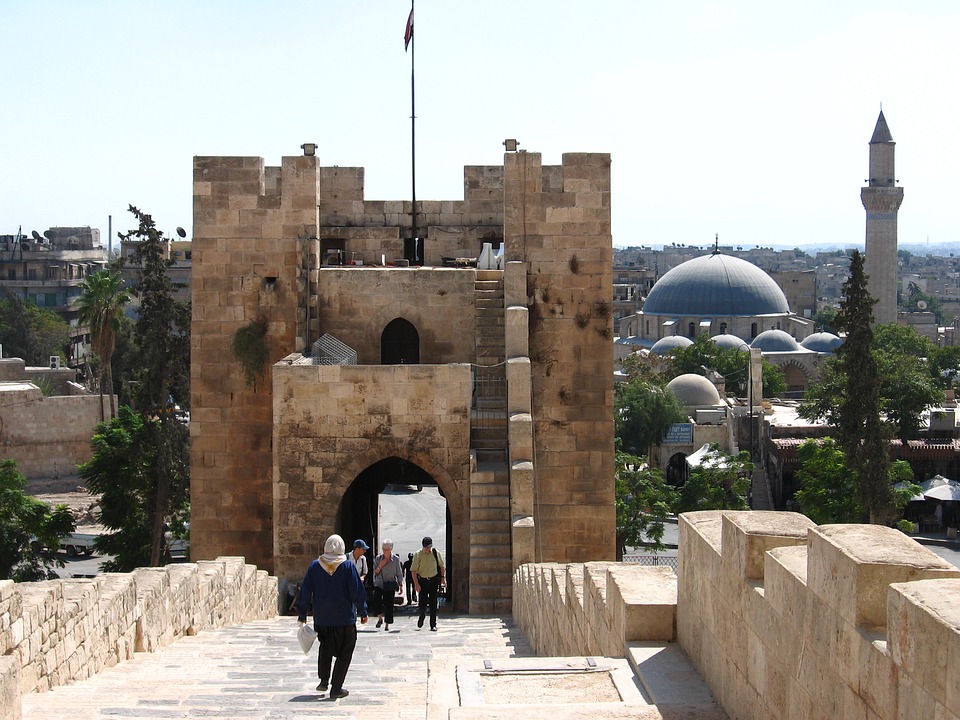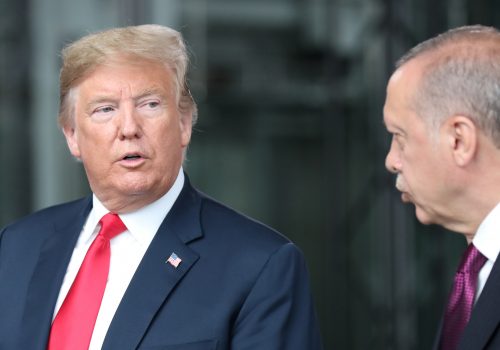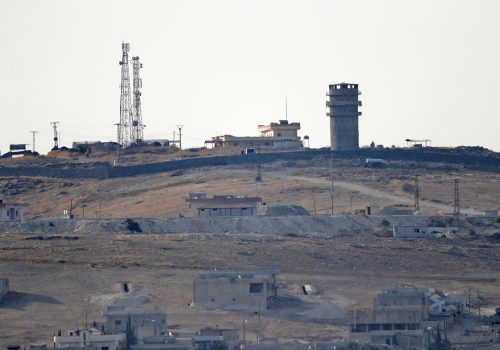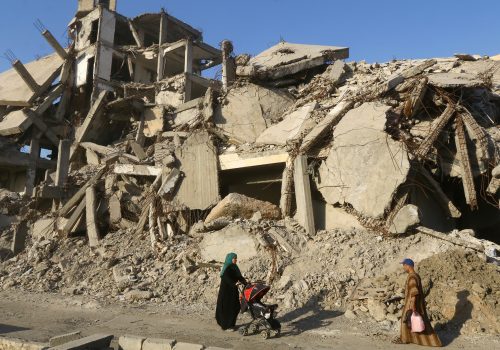For the past eight-plus years this writer has done his best to try to convince American officials that what happens in Syria does not stay in Syria; that Syria matters enough to the security of the United States and the safety of its citizens to merit a comprehensible objective and a consistent (if flexible) strategy.
That effort—in and out of government—has failed. Two successive American presidents, absolutely sure they knew it all and needed no advice, have unintentionally but decisively advanced the work of America’s adversaries. After eight-plus years of responding to gratuitous setbacks with specific proposals on national security objectives and an accompanying, fully resourced strategy, recent events pose a relevant question: Is anything at all salvageable from the latest mega-blunder?
Old habits die hard. Although it is true that the Turkish invasion and its consequences might as well have been scripted by the Bashar al-Assad regime, Iran, Russia, and the Islamic State of Iraq and al-Sham (ISIS),
Indeed, President Donald Trump did not have these dire developments in mind during his October 6 conversation with Turkish President Recep Tayyip Erdoğan. Whether or not he explicitly “greenlighted” a Turkish invasion of Kurdish areas in northern Syria, he erred significantly by leaving his Turkish counterpart with the impression that the United States would not materially oppose a Turkish invasion.
The president would have been well-advised to object strenuously to an invasion on the grounds that the preliminary victory over ISIS could be undone, and a pathway cleared for the regime and Iran to take territories liberated at great cost from ISIS by an American-led coalition. Trump could have asked President Erdoğan to delay matters until he could collect the views of his national security council and consult with leaders in Congress. He could have made it clear to his Turkish counterpart that American troops would stay in place, along with the determination of the United States to defend them from any threat, regardless of the source.
No doubt Ankara has a valid concern with an American partner force dominated by the Syrian branch of the Kurdistan Workers Party (PKK). One of the many recommendations offered by this writer and rejected by those “in the know” was that the United States execute President Barack Obama’s order to “degrade and destroy” ISIS with a professional ground force coalition of the willing instead of a militia, especially one deemed a terrorist organization by a NATO ally. And no doubt Ankara was frustrated and angered by the slow pace of negotiations to create a safe zone inside Syria. But if President Trump had tried and succeeded in putting Turkey on hold, he could have redoubled American efforts to secure Kurdish agreement to a sizeable safe zone, making it clear that addressing the concerns of a NATO ally was a high foreign policy priority, but that Kurdish populations would be protected.
Instead of supporting his national security team’s Syria strategy, however, the president used the call with Erdoğan to yield to his own instincts. President Trump has—contrary to his team—consistently seen the small American military presence in Syria as part of the “endless war” scenario he decries rather than an efficient investment to suppress ISIS and maintain American leverage for the eventual peaceful, negotiated political transition in all of Syria.
His decision to withdraw American forces seems to be facilitating several bad outcomes.
His decision to withdraw American forces seems to be facilitating several bad outcomes. ISIS appears to be resurrecting itself. Syrian Kurds are being driven from their homes in places near the Turkish border, perhaps to be replaced by Syrian Arab refugees involuntarily returned. The Kurdish-led American partner force seems to have made a deal permitting the Assad regime—whose survival strategy of mass civilian homicide made Syria safe for al-Qaeda and ISIS in the first place—to reestablish itself in Syria’s fertile and oil-rich northeast. The icing on this poisoned cake is the shabby treatment of that partner force, amplified gratuitously by insulting presidential tweets. One wonders if the Department of Defense’s “By, With, Through” global engagement strategy has any lingering pertinence.
The big winners here stand to be Russia, Iran, the Assad regime, and ISIS. This simply cannot be permitted.
Ideally President Erdoğan will, having made his point about Turkey’s need for a safe zone, be content to declare a near-term ceasefire and permit displaced Kurds to return home. Not all Syrian Kurds—far from it—support the PKK. And ethnic cleansing by a NATO member would be unthinkable.
If Erdoğan is willing to apply a diplomatic tourniquet to a grave wound needlessly inflicted, Washington and Ankara can discuss the possibility of Turkish military units leap-frogging predominantly Kurdish areas in Syria to serve as the new ground force component of the anti-ISIS coalition in Arab northeastern Syria. There must be a clear understanding with Turkey about empowered Kurdish local governance in Kurdish areas within the safe zone; governance that presents no threat to Turkey while permitting Kurds to escape the clutches of an Assad regime whose intelligence services have long lists of people to be arrested, tortured, and killed.
Yet if the United States is to be completely out of northeastern Syria, Turkey must be completely in. Someone has to seal the victory over ISIS by overseeing the stabilization of liberated territories and securing the Euphrates River deconfliction line from regime troops, Iranian-led militias, and Russian mercenaries. If the Turkish Army wishes to replace the Syrian branch of the PKK as the ground force combat component of the anti-ISIS coalition, fine. But the U.S. and the coalition would be hard-pressed to work with Ankara if ethnic cleansing is taking place in Kurdish areas. And Turkey would need substantial assistance in stabilizing the area, getting reconstruction started, and resettling Syrian refugees willing to move voluntarily to Syria east of the Euphrates.
Before the Trump-Erdoğan telephone call the administration had seemed to settle on a strategy of maintaining a modest military presence in northeastern Syria to suppress ISIS, to facilitate the stabilization of northeastern Syria by keeping the enablers of ISIS—the Assad regime, Iran, and Russia—out, and to maintain a degree of diplomatic leverage in the search for a sustainable Syrian political settlement. Even before the call the strategy was under-resourced and handicapped by a largely Kurdish partner force—which had performed bravely against ISIS and which was overseeing ISIS-related detention facilities—trying to govern predominantly Arab liberated areas.
That strategy seems to have been undone entirely. Analytically it would be easy to say nothing is salvageable; that eight-plus years of bad policy have culminated in an epic foreign policy disaster. Operationally, however, the American national security apparatus does not have the luxury of analytical defeatism. The safety of the United States and its allies from the ugly consequences of a rapacious, murderous regime and its allies still comes first. Even if the cast of characters shifts, ISIS must be suppressed and leverage maintained.
Ambassador Frederic C. Hof is Bard College’s Diplomat in Residence and a Distinguished Senior Fellow of the Rafik Hariri Center for the Middle East.
Further Reading
Image: Civilians walk across the citadel in Aleppo, Syria on a sunny day. Photo courtesy of Dianne Ket.



